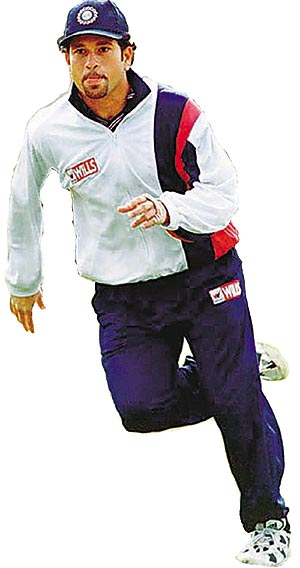 |
| Saturday, February 5, 2000 |
|
 |
|
SOMETHING must be terribly wrong with
Indian cricket these days. At home we notch up win after
win, no matter how strong the opposition, series after
series while abroad we are led like lambs for slaughter
in match after match as has  been
the case in Australia. True, even in the past India have
been defeated abroad but this time around in Australia
India were not only defeated but overwhelmed in all
departments of the game. While it is no use crying over
spilt milk, drastic measures are called for if the Indian
team has to get back on the rails. Cricket has become the
"national game" of the country, thanks to the
hype created by the electronic media and the marketing
people who have helped the cricketers rake in millions.
But they must remember one thing, if the cricketers fail
to perform, the pots of money which they are getting are
bound to dry up, sooner than later. For maintaining the
hype the game now generates, it has become imperative for
players to perform at their peak potential, which,
unfortunately, they are not doing, or so it appears. been
the case in Australia. True, even in the past India have
been defeated abroad but this time around in Australia
India were not only defeated but overwhelmed in all
departments of the game. While it is no use crying over
spilt milk, drastic measures are called for if the Indian
team has to get back on the rails. Cricket has become the
"national game" of the country, thanks to the
hype created by the electronic media and the marketing
people who have helped the cricketers rake in millions.
But they must remember one thing, if the cricketers fail
to perform, the pots of money which they are getting are
bound to dry up, sooner than later. For maintaining the
hype the game now generates, it has become imperative for
players to perform at their peak potential, which,
unfortunately, they are not doing, or so it appears.In fact, it will be of no use if somebody or the other is blamed for India’s debacle Down Under. There will be no use if the powers that be in the BCCI go on a witch-hunt, trying to pin the responsibility for the defeat on say the cricket manager, Kapil Dev, or even the skipper, Sachin Tendulkar, who would probably like to forget the tour of Australia like a bad dream. But then Kapil, as also Sachin, must have to necessarily share part of the blame for India’s miserable showing in Australia. And given the state of the relation between Lele and Kapil Dev, it should surprise no one if Kapil is unable to complete his two-year term as cricket manager. Soon after Kapil Dev was appointed cricket manager by the general body of the BCCI, differences surfaced between the BCCI Secretary and him on minor issues and they are threatening to rip apart India’s cricketing fabric. The board Secretary had reportedly said that India would lose the Test series 3-0 (he later denied having said so) and had also gone on record to say that Kapil was exceeding his brief when he invited Ajit Agarkar to attend nets when India were playing New Zealand at home a couple of months ago. For a Board flush with funds how does it matter if a couple of thousands are spent on providing DA/TA to a player? Kapil, on his part, has communicated with the BCCI President instead of the Secretary on every issue. In any case Kapil Dev has a larger than life image in the annals of Indian cricket. But it is apparent that he is yet to learn the wheels within wheels in the Indian cricket set-up. Even the one-time greatest allrounder of the world will obviously not be given a free hand in running the Indian team, what to speak of Indian cricket, as he had once suggested. What the board should do is to allow the cricket manager a free hand during his tenure and not interfere in matters concerning cricket. And if he cannot deliver in the given time schedule, he should be sacked. But during his tenure he should not be disturbed. But that is easier said than done, given the fact that the Board officials have very little technical knowledge of the game they administer.
And that will still take a lot of doing given the fact that the players are still divided along regional lines. So much so that the players often speak in a number of languages while on the ground. (Compare this with any other team who all speak in a common language. Even the West Indies squad which has players from different countries speak a common language — English). Not only that, captaincy has also affected Sachin’s batting and his string of low scores (at least by his very high standards) in Australia speaks of the mental pressure he is under. But then it will be extremely foolhardy of the captain to expect every member of the team to bat like him. Sachin is a complete cricketer and has immense belief in himself (remember the last over bowled by him against South Africa in the Hero Cup semi-final at the Eden Garden). How this aspect is to be tackled has to be looked into by the people who run the game in the country provided they can bury their own likes and dislikes. But is it possible, given the fact that every year the BCCI elections sees so much of politicking ? There were too many glaring discrepancies in Sachin’s leadership in Australia, and now that he is no longer a rookie captain he is getting a lot of flak for it. For example, in a crucial tie against Pakistan India were fined two overs for slow over rate; wicketkeeper Sameer Dighe, playing his first one-day international, was sent in to bat at No 3 when Srinath was in the squad and he consumed 25 balls for three runs; and one must remember that Srinath has in the past has come off very good as pinch-hitter; spinner Nikhil Chopra replaced injured Ajit Agarkar on a pacer’s wicket and did not get a single over. On the other hand, Debashish Mohanty was played in a spinner-friendly wicket and got a pasting. A player like Sunil Joshi got a single match (and that too due to injury to Anil Kumble) and somebody whom even Kapil rated so highly —Tamil Nadu’s T. Kumaran— was not fielded in the tri-series and was sent back home.
It is apparent that Sachin got a weak team for the tour but then he asked for it. It is of no use saying now that the Indian team was the most inexperienced in recent times, by Sachin’s own admission. The captain and the cricket manager had sought the team. It is really a pity that the selectors did not put their foot down and insisted that the best possible players be sent to Australia. By agreeing to the exclusion of players like Ajay Jadeja (who always insisted that he was fit and was ready to prove his fitness) and Azhar, the Indians indeed had to pay a very heavy price. While nobody is arguing that youth should not get a chance to play for the country (Sachin himself made his Test debut at 16), youngsters should find a place in the team on merit alone and not on the age factor ! It will take quite some explaining how Robin Singh, 36 plus, qualifies to play for the country but not the former India captain. Where does Indian cricket go from here ? Obviously, the whole set-up in the country needs an overhaul. To start with, every state must have one grassy wicket and all first class matches must be played on it. By doing so, the Indian players will get used to play on bouncy tracks which every team has to face touring abroad. But to do this money will be required but for a cash-rich association like the BCCI it should pose no problem. The current domestic
calendar needs a change as certain former players are
demanding. Instead of the current format of the Ranji
Trophy where three teams from each zone go to the super
league stage, the preliminary league matches should be
done away with and the national cricket championship must
be played on division basis with the top 15 teams
constituting Division I, while the remaining teams should
be placed in Division II. And at the end of each season,
the two top teams should be promoted to Division I while
the last two teams from the top division should be
relegated to the lower division. This will not only All players hoping to play international cricket (including the current stars) must compulsorily play a minimum number of matches for their respective states. By doing so two purposes will be served — one will get to know the standard of the game and, secondly, players hoping to make it to the national team will get to know where they stand while facing the best in the country. The BCCI should immediately appoint a paid cricket director to look into India’s international schedule to see that players do not play too much cricket as has been the case in the recent past. Cricket, besides being a sport, is probably India’s biggest entertainment industry and, therefore, all efforts should be made to run it on professional lines. The paid cricket director, who should necessarily be a former Test player, can not only understand the problems faced by cricketers but will be in a position to work out solutions. What the BCCI should really do is to follow the age-old adage of "catch them young". It is at that stage where the basics of the game can be taught as also the newer techniques various countries are adopting. It is no use teaching a player selected to play for the country how to take a sharp single or how to cover the wickets when fielding. |